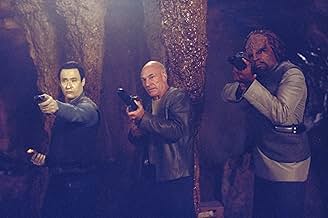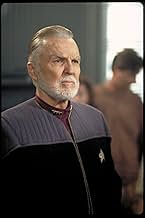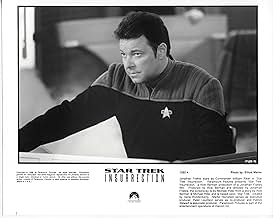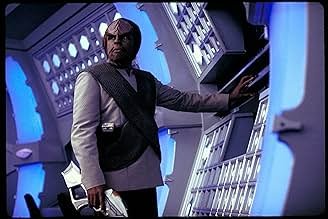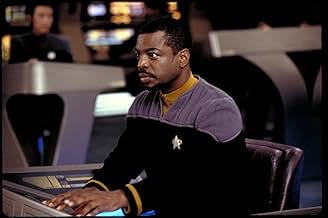IMDb RATING
6.4/10
81K
YOUR RATING
When the crew of the Enterprise learn of a Federation conspiracy against the inhabitants of a unique planet, Captain Picard begins an open rebellion.When the crew of the Enterprise learn of a Federation conspiracy against the inhabitants of a unique planet, Captain Picard begins an open rebellion.When the crew of the Enterprise learn of a Federation conspiracy against the inhabitants of a unique planet, Captain Picard begins an open rebellion.
- Awards
- 3 wins & 8 nominations total
LeVar Burton
- Geordi
- (as Levar Burton)
Featured reviews
Data is on a remote planet as part of an covert exploration mission when he malfunctions, attacks his colleagues and exposes the mission to the small group of natives on the planet. The Enterprise is called in to help capture him and, when they do, they find that he was protecting the inhabitants for some reason. Picard investigates and uncovers a plot between members of the Federation and the aging Son'a's to move the Ba'Ku off the planet and harvest it's age defying effects for themselves.
While it is 100% fact that the odd numbered Star Trek films are not as good as the even numbers, this film will not help to dispel the theory. While not the worst Star Trek film, it does have plenty of problems that stops it being better than it should be. The main weakness is the plot which, at the start, is morally difficult. I mean why wouldn't it make sense to move the Ba'ku and allow them to share the power of the planet with many millions of others and not just keep 500 alive forever? This is nicely forgotten when the film decides it needs a bad guy and gives things over to the Son'a a good move in terms of creating a more action packed climax but a poor move in terms of plot logic. The action is so-so allowing for battles in space and on the planet, but it is not as dramatic as I hoped with the planet based stuff taking away from the film and not being as dramatic as it could have been.
The script does allow some witty moments but too often the dialogue is a bit ponderous, and there are no great lines or really memorable spells of dialogue or interaction. The romance between Picard and Anij is a bit of a distraction, as is the stuff between Riker and Troy points of the film feel a bit more like a space soap/romance rather than sci-fi as I think of it.
The cast are average. Most have the odd good line or scene but really the majority of the group do not have much to do. Stewart has the lion's share of the film, despite the romance slowing things down. Frakes has some good scenes but is a far second, seeming happy to direct. Abraham does an OK baddie and the rest of the Enterprise cast basically do what they are accustom to doing weekly and they don't really rise to the film occasion.
Overall this is an average film and keeps the trend of `even good, odd not so good' Star Trek films going nicely. The holes in the plot are a bit of a pain no matter how hard I tried to ignore them it would have been nice if the debate hadn't been side tracked by a more traditional plot.
While it is 100% fact that the odd numbered Star Trek films are not as good as the even numbers, this film will not help to dispel the theory. While not the worst Star Trek film, it does have plenty of problems that stops it being better than it should be. The main weakness is the plot which, at the start, is morally difficult. I mean why wouldn't it make sense to move the Ba'ku and allow them to share the power of the planet with many millions of others and not just keep 500 alive forever? This is nicely forgotten when the film decides it needs a bad guy and gives things over to the Son'a a good move in terms of creating a more action packed climax but a poor move in terms of plot logic. The action is so-so allowing for battles in space and on the planet, but it is not as dramatic as I hoped with the planet based stuff taking away from the film and not being as dramatic as it could have been.
The script does allow some witty moments but too often the dialogue is a bit ponderous, and there are no great lines or really memorable spells of dialogue or interaction. The romance between Picard and Anij is a bit of a distraction, as is the stuff between Riker and Troy points of the film feel a bit more like a space soap/romance rather than sci-fi as I think of it.
The cast are average. Most have the odd good line or scene but really the majority of the group do not have much to do. Stewart has the lion's share of the film, despite the romance slowing things down. Frakes has some good scenes but is a far second, seeming happy to direct. Abraham does an OK baddie and the rest of the Enterprise cast basically do what they are accustom to doing weekly and they don't really rise to the film occasion.
Overall this is an average film and keeps the trend of `even good, odd not so good' Star Trek films going nicely. The holes in the plot are a bit of a pain no matter how hard I tried to ignore them it would have been nice if the debate hadn't been side tracked by a more traditional plot.
If you are a Star Trek fan( of which i am) you will not be disappointed by Insurrection. The story is good and the acting is up to it's high standards the only let downs are the lack of any real great special affects and the lame enemies. I would not say this is as good as first contact but never the less well worth watching. 7 out of 10
Don't let some of the bad reviews for this film put you off watching it. I finally got around to watching it last week and I must say that It was no where near as bad as what some people have said about it. In-fact I thought it was pretty good. It's not the best Star Trek film but it's not the worst either. Some people have criticized it by saying that it looks like an extended television episode- All the films except 'the motion picture' have - what's the point of changing the television look and feel when it is so good? The one time they did try to change it from the episode feel (the motion picture) it was crap. Come on people, this is Star Trek - what were you expecting - this was not meant to be another Shawshank Redemption. I like this film so I'm going to give it 8 out of 10 because I don't care what other people say.
"We are betraying the principles upon which the Federation was founded," states Captain Jean-Luc Picard 49 minutes into the ninth Star Trek film, "It's an attack upon its very soul." "Jean-Luc," answers his superior, Admiral Dougherty, "We're only moving six-hundred people." "How many people does it take, Admiral, before it becomes wrong," asks Picard in return, "A thousand. Fifty Thousand. A million?"
The above exchange occurs during Insurrection's key scene. The entire first half of the film meticulously builds to this conversation between Starfleet officers. Dougherty (Anthony Derbe) justified his actions because the needs of the many outweigh the needs of the few. Picard (Patrick Stewart) sights the Prime Directive, which prohibits interference with other cultures or their natural development. The two officers had remained on a collision course until the moment when something had to give.
The conflict begins during a routine survey. Insurrection opens with a gorgeous panorama of an agrarian village. Children frolic about in the tall grass outside the perimeter. Farmers lift gates to aqueducts, women laugh pleasantly as they slam down their bread dough for kneading and the blacksmith works away. We are treated to long panoramic looks at the restful town and its benign inhabitants, the Ba'ku. Members of a culture survey walk about unnoticed in their isolation suits, invisible to the eye. Director Jonathan Frakes' willingness to take so much time introducing the audience to the setting demonstrates an unusual amount of focus for a movie like this.
The peace is shattered when Data (Brent Spiner) begins acting wildly. He exposes the survey and follows with many more bizarre and aggressive actions. The architects of survey, Admiral Dougherty and the So'na leader Ad'har Ru'afo (F. Murray Abraham) orbit above the planet. Data's behavior puzzles and scares them, and they ask Picard how to destroy him.
Delaying his orders, Picard (Patrick Stewart) arrives and successfully captures Data. Against the wishes of Dougherty, Picard stays to determine why his android became a loose cannon. Picard acquaints himself with Anij (Donna Murphy), a Ba'ku woman who informs him that Data told the Ba'ku that the survey team was their enemy. A short investigation uncovers a conspiracy to forcibly remove the Ba'ku from their planet.
The planet, buried deep in a gaseous cloud called the Briar Patch, has rings that act as a fountain of youth to its inhabitants. Dougherty and Ru'afo believe that the planet must be used for medical reasons, and Picard is forced to make the choice to abandon the Ba'ku or violate his orders.
It is at this point when the film accelerates. The conflict becomes a proverbial chess match between grand masters as the Enterprise crew tries to keep the planet inhabited. Both sides devise as many solutions as they can think of to accomplish their missions. The audience is almost invited to participate as the movie keeps them wondering what the next move will be.
The script shines with an abnormal level of polish. It deftly handles the question of whether an officer should obey orders or stand up for what is right. Almost every line flawlessly captures the writers' intent and communicates them to the viewers with beautiful yet easily understood diction. Every character sounds expressive and well educated. The dialogue is free-flowing and enjoyable. There is even a scene where Picard calms Data with a rousing rendition of "A British Tar." I imagine the production staff had a good laugh when they thought of that one.
The acting is of the highest Trek standards. Abraham, one of the true gentlemen in Hollywood, is exceptionally good as Ru'afo. He is so superior that he has every subtlety mastered. The way his face sneers when he says "Eliminate them," his vocal inflections, his different postures, his mannerisms, the passion and disdain in his voice all point to the work of a true master. Hatred seems to perspire from his every pore. A blood vessel bursts in his face and we can almost see hate flowing out of it. His friend Gellatin (Gregg Henry) is constantly talking him out of more extreme decisions. For Ru'afo, it is personal, but we do not find out why until the final act. He tops it all off with the best scream of anguish and frustration ever captured on film. Ru'afo may not quite be the most effective Star Trek villain, but Abraham's acting is the best in the series. He is not the most prolific actor, but he is arguably one of the best ever.
Sadly, some of the story devices fall flat. In First Contact, the Enterprise was the most advanced starship ever made. Its quantum torpedoes were so powerful that it seemed nigh invincible. Here, however, it is too weak. There is one exchange where it is fighting with two So'na ships and seems badly overmatched. The Enterprise-E was designed to take on small fleets and win. If the Federation could defeat "the Borg, the Cardassians, the Dominion," why can't the crown jewel of its fleet defeat two So'na cruisers? It is even controlled at one point by simple joystick. I never knew flying a 700-meter starcraft was so simple. Redemption does come with the ingenious denouement of the fight. There are also other moments that do not work, and some jokes fall flat.
In the end, Insurrection shoots itself in the foot. It also suffers from following First Contact and the Borg. It is an entirely different production with different goals. It may hurt itself, but in the end it is solid enough entertainment to rate a seven out of ten.
The above exchange occurs during Insurrection's key scene. The entire first half of the film meticulously builds to this conversation between Starfleet officers. Dougherty (Anthony Derbe) justified his actions because the needs of the many outweigh the needs of the few. Picard (Patrick Stewart) sights the Prime Directive, which prohibits interference with other cultures or their natural development. The two officers had remained on a collision course until the moment when something had to give.
The conflict begins during a routine survey. Insurrection opens with a gorgeous panorama of an agrarian village. Children frolic about in the tall grass outside the perimeter. Farmers lift gates to aqueducts, women laugh pleasantly as they slam down their bread dough for kneading and the blacksmith works away. We are treated to long panoramic looks at the restful town and its benign inhabitants, the Ba'ku. Members of a culture survey walk about unnoticed in their isolation suits, invisible to the eye. Director Jonathan Frakes' willingness to take so much time introducing the audience to the setting demonstrates an unusual amount of focus for a movie like this.
The peace is shattered when Data (Brent Spiner) begins acting wildly. He exposes the survey and follows with many more bizarre and aggressive actions. The architects of survey, Admiral Dougherty and the So'na leader Ad'har Ru'afo (F. Murray Abraham) orbit above the planet. Data's behavior puzzles and scares them, and they ask Picard how to destroy him.
Delaying his orders, Picard (Patrick Stewart) arrives and successfully captures Data. Against the wishes of Dougherty, Picard stays to determine why his android became a loose cannon. Picard acquaints himself with Anij (Donna Murphy), a Ba'ku woman who informs him that Data told the Ba'ku that the survey team was their enemy. A short investigation uncovers a conspiracy to forcibly remove the Ba'ku from their planet.
The planet, buried deep in a gaseous cloud called the Briar Patch, has rings that act as a fountain of youth to its inhabitants. Dougherty and Ru'afo believe that the planet must be used for medical reasons, and Picard is forced to make the choice to abandon the Ba'ku or violate his orders.
It is at this point when the film accelerates. The conflict becomes a proverbial chess match between grand masters as the Enterprise crew tries to keep the planet inhabited. Both sides devise as many solutions as they can think of to accomplish their missions. The audience is almost invited to participate as the movie keeps them wondering what the next move will be.
The script shines with an abnormal level of polish. It deftly handles the question of whether an officer should obey orders or stand up for what is right. Almost every line flawlessly captures the writers' intent and communicates them to the viewers with beautiful yet easily understood diction. Every character sounds expressive and well educated. The dialogue is free-flowing and enjoyable. There is even a scene where Picard calms Data with a rousing rendition of "A British Tar." I imagine the production staff had a good laugh when they thought of that one.
The acting is of the highest Trek standards. Abraham, one of the true gentlemen in Hollywood, is exceptionally good as Ru'afo. He is so superior that he has every subtlety mastered. The way his face sneers when he says "Eliminate them," his vocal inflections, his different postures, his mannerisms, the passion and disdain in his voice all point to the work of a true master. Hatred seems to perspire from his every pore. A blood vessel bursts in his face and we can almost see hate flowing out of it. His friend Gellatin (Gregg Henry) is constantly talking him out of more extreme decisions. For Ru'afo, it is personal, but we do not find out why until the final act. He tops it all off with the best scream of anguish and frustration ever captured on film. Ru'afo may not quite be the most effective Star Trek villain, but Abraham's acting is the best in the series. He is not the most prolific actor, but he is arguably one of the best ever.
Sadly, some of the story devices fall flat. In First Contact, the Enterprise was the most advanced starship ever made. Its quantum torpedoes were so powerful that it seemed nigh invincible. Here, however, it is too weak. There is one exchange where it is fighting with two So'na ships and seems badly overmatched. The Enterprise-E was designed to take on small fleets and win. If the Federation could defeat "the Borg, the Cardassians, the Dominion," why can't the crown jewel of its fleet defeat two So'na cruisers? It is even controlled at one point by simple joystick. I never knew flying a 700-meter starcraft was so simple. Redemption does come with the ingenious denouement of the fight. There are also other moments that do not work, and some jokes fall flat.
In the end, Insurrection shoots itself in the foot. It also suffers from following First Contact and the Borg. It is an entirely different production with different goals. It may hurt itself, but in the end it is solid enough entertainment to rate a seven out of ten.
Insurrection features a wonderful score during the opening sequence and throughout. This added to my enjoyment of the film. I have to admit, the battle sequence between the Enterprise and the S'ona ships is too fast, poorly edited and unimpressive. Overall, however, I enjoyed the performances from Stewart and Donna Murphy and the light-hearted tone of the film. While not in the same league as First Contact, Insurrection is a satisfying Sci-Fi film which feels more like a good tv episode (with great cinematography). Don't expect FC and you'll do fine with this movie.
Did you know
- TriviaIn the scene where Captain Picard and the Admiral are in Picard's ready room, there is a cloth on the back of Picard's chair. This is the cloth given to him by the Mintakans in Who Watches The Watchers (1989), an episode in which Starfleet used a duck blind for anthropological purposes.
- GoofsTroi comments that she had never kissed Riker with a beard before. Yet Troi had kissed the bearded Riker in Ménage à Troi (1990), as well as in several other occasions on Star Trek: La nouvelle génération (1987).
- Quotes
Admiral Matthew Dougherty: Jean-Luc, we're only moving 600 people.
Captain Picard: How many people does it take, Admiral, before it becomes wrong? Hmm? A thousand, fifty thousand, a million? How many people does it take, Admiral?
- Alternate versionsThe original version of the movie contained several scenes that were cut before release:
- an extended library scene in which Riker and Troi throw small paperballs at each other. This scene also include some lines by the Librarian (Lee Arone-Biggs) and a Trill Officer (Max Grodénchik);
- a scene in which Picard and Anij kiss each other;
- a scene in which Picard spills cheese on a PADD displaying the Briar Patch;
- the actual ejection of the warp core;
- Data punching some Son'as on the planet and nailing them with iso-linear tags;
- "There will be no cover-up!" line on the Son'a ship.
- SoundtracksTheme from Star Trek: The Motion Picture
by Jerry Goldsmith
Details
- Release date
- Country of origin
- Official site
- Language
- Also known as
- Viaje a las estrellas: Insurrección
- Filming locations
- Convict Lake, California, USA(Data enters the lake)
- Production company
- See more company credits at IMDbPro
Box office
- Budget
- $58,000,000 (estimated)
- Gross US & Canada
- $70,187,658
- Opening weekend US & Canada
- $22,052,836
- Dec 13, 1998
- Gross worldwide
- $112,587,658
- Runtime1 hour 43 minutes
- Color
- Sound mix
- Aspect ratio
- 2.39 : 1
Contribute to this page
Suggest an edit or add missing content

Top Gap
By what name was Star Trek : Insurrection (1998) officially released in India in English?
Answer


